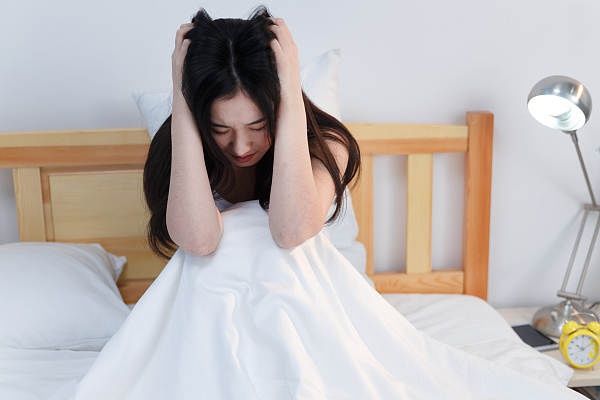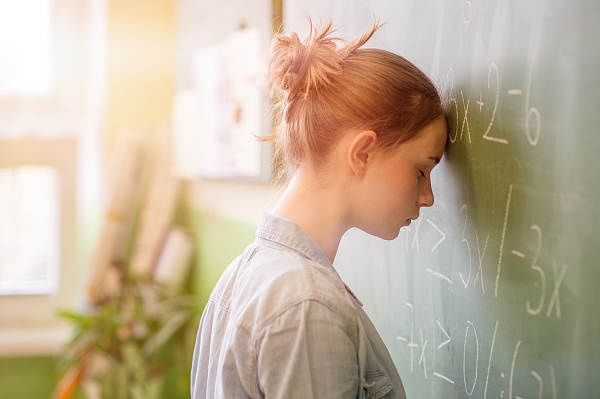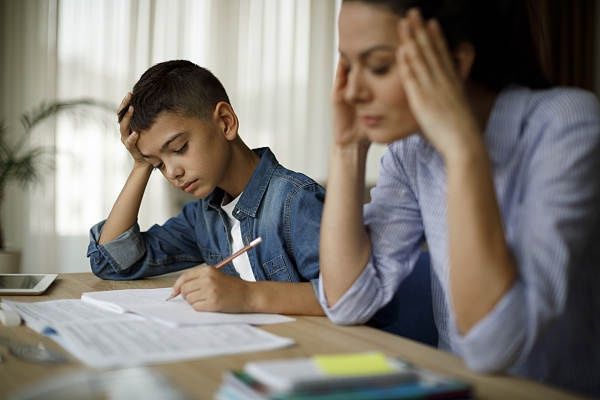Qianjiang Evening News Hours News reporter Yang Qian correspondent Xu Youjia Image source cfp
“More and more children are seeing insomnia now, and they can meet five or six almost every week. It is usually around 15 years old.”
Recently, Professor Zhang Yonghua, the subject leader of the Sleep Medicine Center of Hangzhou Hospital of Traditional Chinese Medicine and a provincial-level famous Chinese medicine practitioner, found that there is a very typical “15-year-old phenomenon” in the outpatient clinic—come The young patients who came to the clinic were all students in the second and third year of junior high school, and most of the symptoms were insomnia and anxiety caused by various reasons such as academic pressure.

“nervous” to blame? 15-year-old girl and her mother watch insomnia together
Not long ago, 15-year-old girl Xiao Zhang (pseudonym) found Professor Zhang Yonghua in the outpatient clinic because of the problem of insomnia at night.
Xiao Zhang has been a child with excellent academic performance since she was a child, and her academic performance has always been among the best. The more it affects the performance. The teacher’s criticism of her also invisibly increased her pressure. After returning home, her mother was even more anxious when she saw her grades. She thought her daughter’s attitude towards learning was not serious, and she often lectured and accused her.
Xiao Zhang gradually became unhappy, and he didn’t know when his sleep was affected. At one or two in the morning, he couldn’t fall asleep, and his spirits fell during the day. In this state, his academic performance declined significantly. Seeing these changes in her daughter, her mother became anxious and insomniac. In the end, Xiao Zhang felt that she could not continue like this, and asked her to go to the hospital for treatment with her mother.
Professor Zhang Yonghua was very impressed with Xiaozhang’s mother and daughter, because during the consultation, every time Xiaozhang had not finished speaking, her mother interrupted her directly, and her speech was fast and the content was Complaining about her daughter’s lack of sleep at night, attributing the decline in grades to the child’s lack of attention and effort.
“Parents, please calm down and let the patient describe his condition.” After listening to Xiaozhang’s description, Zhang Yonghua basically made a clear judgment: the patient Xiaozhang himself belongs to the person who works more seriously and pursues perfection. The personality is also more sensitive, and sleep is affected by the combined effects of the pressure of long-term study and the pressure of the surrounding environment.
“From the perspective of symptoms, although the daughter has some anxiety, the parents’ anxiety is more obvious.” At Zhang Yonghua’s suggestion, Xiao Zhang’s mother also did a psychological evaluation, and the results showed that her anxiety He insomnia is more serious than that of his daughter, so the two received traditional Chinese medicine intervention and systemic treatment. After about a month or so, the sleep quality of mother and daughter has improved significantly, mother’s temper is no longer so hot and irritable, and the relationship between mother and daughter has also eased and improved a lot.

Why are more and more teenagers insomnia? The cause may lie in the parents
Zhang Yonghua introduced that in recent years, more and more teenagers suffer from insomnia. In the past six months, his outpatient clinic has always encountered 40 or 50 teenagers who can’t sleep well. Patients, the reasons are mainly in the following two aspects:
The first is the increase in study pressure and less time for rest. Today’s teenagers are facing more and more problems in examinations and further studies, especially in the third and third grades of junior high school, which are high incidence periods. During these periods, there is a lot of learning content, long time, and insufficient daily rest. There are many students who cannot adapt to this kind of high-intensity, fast-paced study life, because the decline in academic performance leads to increased psychological pressure.
The second is that children’s emotional problems are closely related to their parents. Some parents are too impatient and put too much pressure on their children. The so-called “care leads to chaos”, it is normal for academic performance to fluctuate, but some parents are the first to have emotional problems. Coupled with blind criticism and accusations, it is easy to make children feel depressed or even rise to insomnia and anxiety.
There are also many parents who think that their children’s lack of sleep at night and their dislike of learning are due to the influence of electronic products such as mobile phones and computers, but in fact, many children have problems with sleep first, and then become dependent on the Internet, resulting in Vicious circle.

To solve the insomnia and anxiety of teenagers requires the joint efforts of many parties
Zhang Yonghua emphasized that many families today are concerned about psychological problems. Their awareness of seeking medical treatment has gradually increased, especially many children take the initiative to seek medical treatment for insomnia. This is a good thing, but to solve the sleep and emotional problems of teenagers, we need to start from multiple perspectives.
First of all, parents should control their emotions in front of their children. What children need more is comfort and encouragement when they encounter setbacks. When communicating with children, slow down the rhythm and have a calm expression. The key is to listen more and output less. Zhang Yonghua uses “3:1” to describe the communication between parents and children, that is, the child speaks three sentences and the parent speaks one sentence, giving sufficient space for words and emotional expression.
Secondly, teenagers should also actively look for outlets to relieve stress and change their mood, and never over-rely on electronic products due to anxiety and insomnia. Usually, you can formulate a product use plan and improve self-discipline. You must not indulge in mobile phones before going to bed at night.
“From the perspective of traditional Chinese medicine, insomnia patients are divided into phlegm dampness block, heart and spleen deficiency, liver stagnation and qi stagnation, yin deficiency and fire exuberance, and kidney deficiency. Different environments often have different combinations of symptoms, and in clinical practice, each individual needs to be treated and prescribed differently, which is TCM’s syndrome differentiation and treatment.”
For early mild to moderate insomnia, the effect of TCM conditioning to improve insomnia is relatively obvious. However, if the symptoms of insomnia are more serious, or even serious emotional problems such as depression and anxiety have occurred, it should be combined with the standardized treatment of Chinese and Western methods.